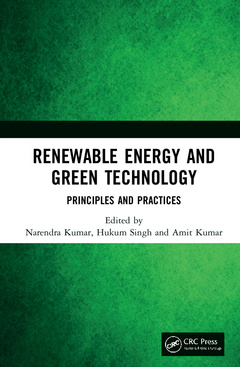Description
Renewable Energy and Green Technology
Principles and Practices
Coordinators: Kumar Narendra, Singh Hukum, Kumar Amit
Language: English
Keywords
Energy Sources; Moisture Content; Energy Resources; Energy Systems; Re; Soil Fertility; Energy Policy; Hydrothermal Liquefaction; Energy Conservation; Above Ground; Power Plants; Wind Turbine; Biomass Briquetting; Wind Energy Technologies; Wind Energy Farms; IEA Bioenergy; Water Footprint; Socioeconomic Development; Hydrothermal Carbonization; Endothermic Stage; Synchronous Generator; Biochar Production; Socio-economic Development; Wind Energy Plant; Fast Pyrolysis
· 17.8x25.4 cm · Hardback
Description
/li>Contents
/li>Readership
/li>Biography
/li>
Renewable Energy and Green Technology: Principles and Practicesis based on the present need to understand the principles and utility of renewable energy and green technology to minimize dependency on fossil fuels in global development. Renewable energy is the best and cheapest source of energy as an alternate resource. There is massive potential for renewable energy globally, including in India. The efficient utilization of renewable energy resources could minimize the impact of climate change globally. Generally, renewable energy is generated from essentially inexhaustible sources, including wind power, solar power, geothermal energy, tidal energy, biomass energy, and other sources. Hence, encouraging renewable energy use could save our tomorrow from the climate change perspective and in terms of sustainable food production. This book promotes the exchange of ideas, policy formulation, and collective action to ensure a smooth transition to renewable energy. It describes the technological interventions for reducing environmental and economic damage resulting from the use of conventional energy sources. In this book, the focus is on utilizing various renewable energy sources in diverse sectors. It also elaborates the descriptive methodology of different renewable energies, accompanied by figures and tables. It provides information on biogas energy plants, gasifier technologies, and hydropower technologies, among others, along with their applications. Further, it delves into energy concepts and details significant advantages of the energy resources for sustaining the future world. Lastly, this book will provide instant access to comprehensive, cutting-edge knowledge, making it possible for academicians and researchers to utilize this ever-growing wealth of information.
Key features
- Emphasizes the understanding of the principles and utility of renewable energy and green technology to minimize dependency on fossil fuels in the era of global development
- Focuses on recent trends in renewable energy with principles and practices in relation to climate change
- Highlights advanced approaches for sustainable use of renewable energy sources
- Illustrates the methodology for various aspects of renewable energy with figures and charts
- Discusses the green technology usages of the agriculture and forestry sectors
- Provides comprehensive cutting-edge information for policymakers in the field of renewable energy
1. Fundamentals of Energy: Its Potentials and Achievements
2. Renewable energy: prospects and challenges for the current and future scenarios
3. Green Technology in Relation to Sustainable Agriculture: A Methodological Approach
4. Briquetting: A technique for the densification of biomass for agriculture waste
5. Perspective of Agro-based bioenergy for environmental sustainability and economic development
6. New insight in biogas Plants: A sustainable development approach
7. Efficient utilization of biomass energy for mitigating the future climate change
8. Biofuel production by using biomass and their application
9. Biomass Gasification technologies for sustainability of future energy demand
10. Solar energy Challenges, gadgets, and their application
11. Impact of Renewable Energy in Reducing Greenhouse Gases Emissions
12. Wind energy technologies: current status and future prospective
13. Emerging trends in hydropower energy
14. Biochar: processing technology, characterization, and use in agriculture
15. Socio-Economic Importance of Renewable Energy Sources and their Impacts on the Environment
Dr. Narendra Kumar earned his PhD degree in Plant Physiology from G.B Pant University of Agriculture and Technology, Pantnagar, India. His research work is focused on the response of plants to abiotic stresses. Later, he served as Assistant Professor in various reputed academic institutes especially Surajmal Aggarwal (Pvt.) Kanya Mahavidyalaya, Kichha US Nagar; Dev Bhoomi Group of Institute, Dehradun, India; Uttaranchal University, Dehradun, India. He has published various research articles, book chapters and articles in peer-reviewed journals. Currently, he is working as Research Associate at Forest Ecology and Climate Change Division, Forest Research Institute, Dehradun, India.
Dr. Hukum Singh, Scientist at Forest Ecology and Climate Change Division, Forest Research Institute, Dehradun – India has been actively involved in research and teaching. He received several awards i.e. SERB-DST fast track young scientist research award, UCOST young scientist award, AsiaFlux Japan travel fellowship, VIFRA young scientist research award and VIFA outstanding faculty award. He is a member of various national and international scientific societies/organizations. His research areas focus primarily on ecophysiology, plant response to abiotic stresses, green technology, climate change adaptation and mitigation functional traits, carbon-water-energy flux, and climate change modeling. His previous research was funded from ICFRE, SERB-DST, DST, ISRO, NMHS, MoEF&CC and SFDs. He has supervised many MSc and PhD students and Post-doctoral Fellows and many more are under supervision. He has published various papers/chapters/articles in national and international peer-reviewed reputed journals with high impact factors.
Mr. Amit Kumar is pursuing his PhD in Forestry at Forest Research Institute (Deemed to be University), Dehradun, India. His research work is mainly focused on characterizing plant functional traits of for




